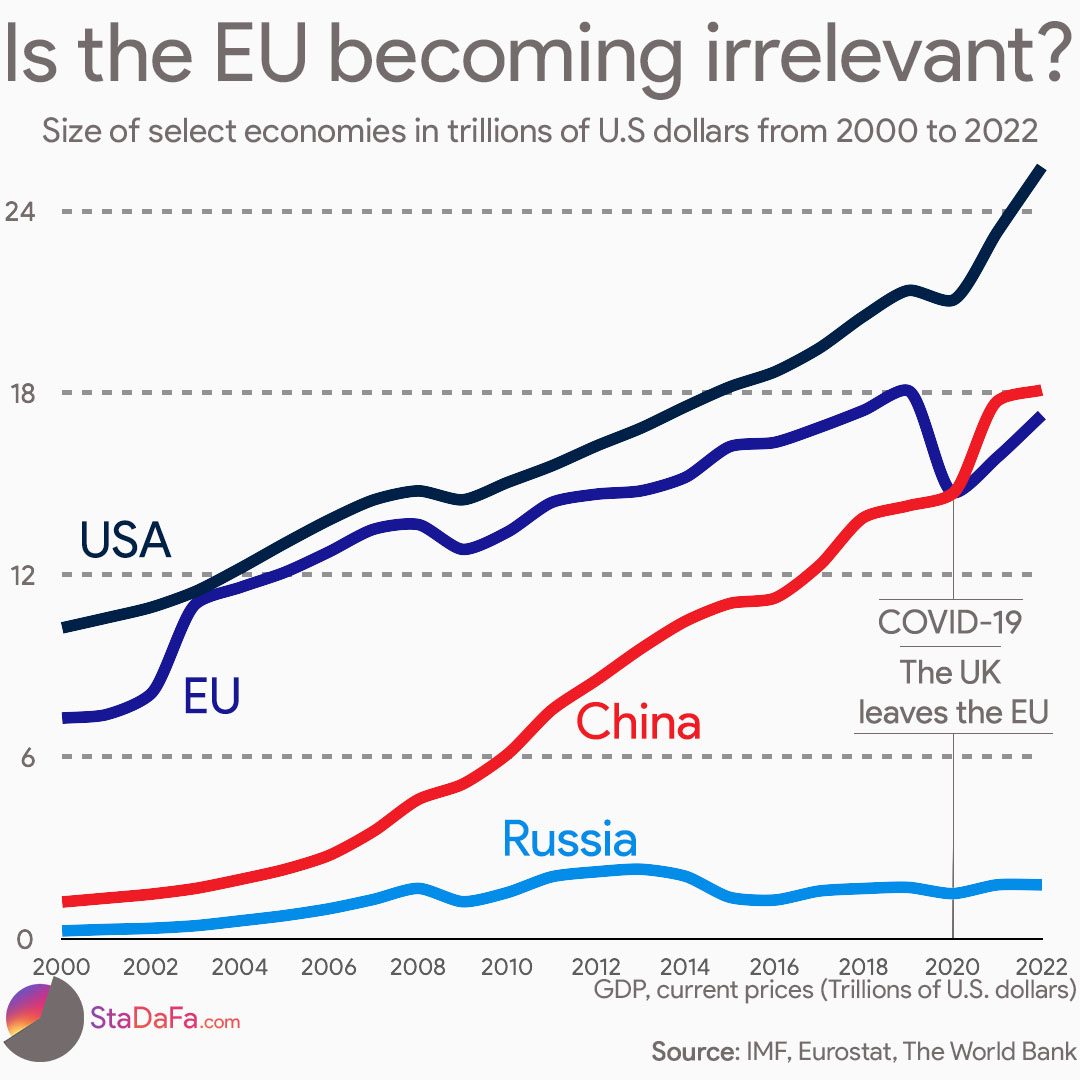Is the EU becoming irrelevant?
This week we take a look at the EU's evolving position on the global stage amidst the economic supremacy of the United States and China.
During a long period in the 00', both the EU and US economies were roughly the same size, but since the global financial crisis, their GDPs have drastically diverged. The US economy standing at 25.5 trillion US dollars is now nearly 50% bigger, compared to the EU's 17.3 trillion. Not only that, but China, with its rapid economic growth, not only caught up but surpassed the EU's GDP in 2020, when the EU was hit not only with the COVID-19 lockdown and its effects, but also with the official exit of the UK from the union.
On the chart, I also included Russia's GDP, to point out how insignificant it is.
Just for comparison, Russia's economy, standing at 1.7 trillion US$ is two and a half times smaller than Germany's (4.3 trillion US$).
The European Union (EU) has long been regarded as a significant player in the global arena, wielding
economic influence, championing democratic values, and shaping international policies. However, with the rapid rise of the United States and China as economic powerhouses, some argue that the EU's position on the global stage is becoming less relevant.
It is undeniable that the United States and China have experienced remarkable economic growth over the past few decades. The US, with its vast market, technological advancements, and robust consumer spending, has consistently maintained its position as the world's largest economy. Similarly, China's economic rise has been nothing short of extraordinary, fuelled by its massive population, export-oriented industries, and aggressive infrastructure development. The sheer size and influence of these two giants have raised concerns about the EU's ability to compete in the global economic landscape.
The EU, consisting of 27 member states, has faced economic challenges in recent years. Slower economic growth, persistent debt burdens in some countries, and structural issues within the Eurozone have hindered its ability to keep pace with the rapid expansion seen in the US and China. Additionally, the EU's bureaucratic processes, divergent national interests, and complex decision-making mechanisms have often led to slower response times and reduced its effectiveness in addressing pressing global issues.
Brexit, the departure of the United Kingdom from the EU, has undoubtedly dealt a significant blow to the bloc's economic and political influence. With the UK being one of the EU's largest economies, its departure has left a void in terms of GDP and market access. The subsequent negotiations and ongoing disagreements over trade terms have underscored the difficulties of maintaining a unified front within the EU, as different member states prioritize their individual interests.
The EU's ambitious goal of deeper integration and a single market has faced hurdles, leading to disparities among member states. Economic disparities between northern and southern countries, such as Germany and Greece, have strained relationships and weakened solidarity within the Union. The structural constraints and the need for consensus among member states on critical issues have limited the EU's ability to swiftly respond to global challenges, further diminishing its relevance.
While economic size is undoubtedly an essential factor in determining global power, it is essential to consider other dimensions of influence. The EU remains a significant player in areas such as foreign aid, climate change mitigation, human rights advocacy, and multilateral cooperation. Moreover, the EU's emphasis on democratic values, the rule of law, and the protection of human rights sets it apart from countries like China, which prioritize economic growth over political freedoms. These non-economic factors contribute to the EU's continued relevance in shaping global norms and policies.
Rather than succumbing to irrelevance, the EU has an opportunity to adapt and recalibrate its strategies to meet the challenges of a changing world. Enhancing economic competitiveness through innovation, investment in research and development, and fostering a more conducive business environment can bolster the EU's economic prowess. Strengthening internal cohesion, streamlining decision-making processes, and addressing socio-economic disparities within member states can restore faith in the EU project and foster a more united front.
The chart with numbers for 2000 and 2022 overlayed.



Comments
Post a Comment